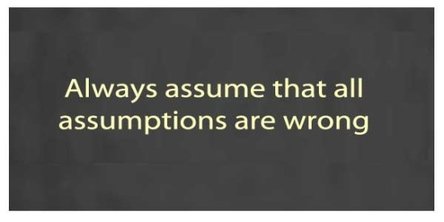
Sometimes we are told things like: We make all sorts of assumptions because we don't have the courage to ask questions.
This gives the impression that assumptions are always clear and always at the fore front of your mind. it's my experience that it can be quite difficult to figure out what your assumptions are and this is where most of our problems come from.
Everyone makes assumptions even those with the sharpest critical thinking skills; it's possible science would advance faster if we spent more time teasing out exactly what we're assuming and being skeptical about whether those assumptions are correct.
One of the assumptions I've teased out about political debates is how happy we are about the state of affairs. Some people are content with how things are. Then there are those who aren't very happy with the state of things.
Then we have the problem with who we want to benefit from the changes they want in politics. Some people want everyone to benefit. Some people only want a single class or group to benefit, while others really only want to benefit themselves. While some people want everyone to benefit, there is a possibility that they themselves might also benefit too. This might not always be a bad thing and depends on their motive(s).
An example: An LGBT person wants marriage equality. This person benefits because they are in love and would like to get married one day. The person's assumption is other people who are in love can marry, why can't this person marry who they choose to love?
Another example: A rich business man wants to have the air quality laws repealed. This person's motives are that he doesn't have to face the expense of replacing the failing air filters on his factory. The person's assumption is that cost is the only consideration.
Another problematic area is the goal of the changes. Some people have a vision of a vastly different future to where we are now and they are talking about reaching that goal now. There are a lot of assumptions going on here. One being that that future will work as the person imagines it will without experimentation or historical examples to draw on.
An example: Communist Russia had very little to do with Marx's blueprint.
Some people are pretty happy with the system we have now, but think there is room for improvement. This assumes there is not some systemic problem.
Some people want revolution. The assumption is that revolution will materially change something and usually benefit themselves or a single group of people of whom the person thinks they belong. This is aimed at the hierarchical structure of society and they want their group elevated in the hierarchy, usually at the expense of another group.
Others want to basically continue with what we have moving at a steady pace to a better world. The assumption that there won't be back sliding and frustration with the perceived slow pace.
So figuring out your assumptions is a good start to seeing what the point of your political debates are.
 RSS Feed
RSS Feed
